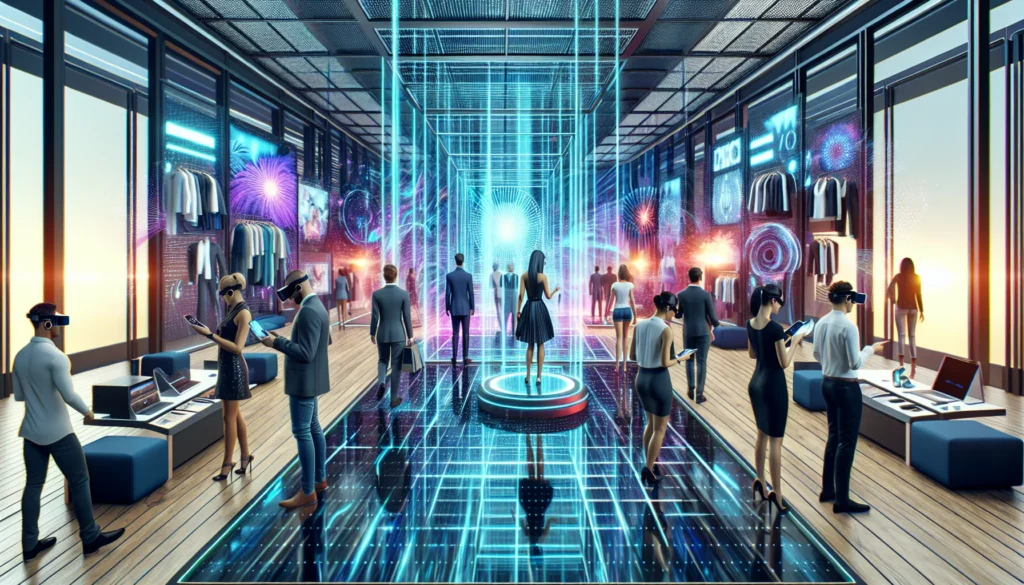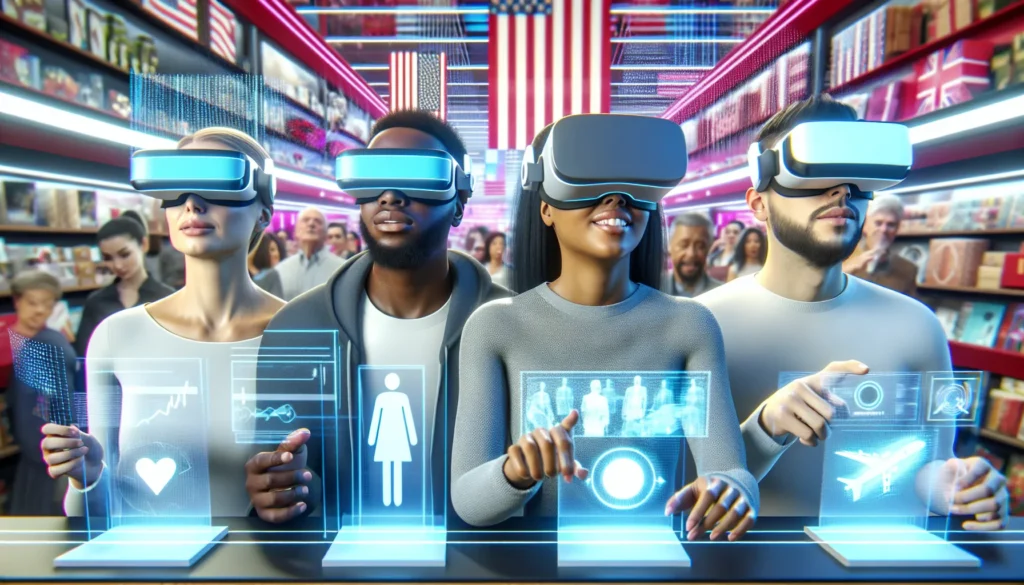Imagine a world where your customers can interact with your brand in a completely immersive digital space. That’s the promise of metaverse marketing—a revolutionary way to connect with audiences like never before. As virtual and augmented reality technologies evolve, the metaverse is becoming a playground for creativity, engagement, and innovation.
You’re no longer limited to traditional ads or social media campaigns. In the metaverse, you can create experiences that let users explore your products, attend virtual events, or even interact with your brand’s avatar. It’s a chance to build deeper connections and stand out in a crowded market. Whether you’re a seasoned marketer or just exploring this new frontier, understanding the potential of metaverse marketing is key to staying ahead.
What Is Metaverse Marketing?
Metaverse marketing refers to strategies and campaigns that utilize immersive virtual environments to connect with audiences. It involves leveraging technologies like virtual reality (VR), augmented reality (AR), and blockchain to create interactive brand experiences. By operating within the metaverse, brands can engage users in digital spaces where they spend time, such as virtual worlds, gaming platforms, and social VR environments.
This type of marketing focuses on creating personalized and participatory experiences. Examples include hosting branded virtual events, launching digital products, and designing interactive VR advertisements. Unlike traditional methods, metaverse marketing integrates with user activities to enhance engagement rather than interrupt them.
The metaverse enables new ways to establish brand presence. Businesses can develop virtual storefronts, partner with metaverse platforms, or use NFTs (non-fungible tokens) to provide exclusive content and rewards. These strategies help foster a sense of community and loyalty while showcasing innovation in a highly competitive landscape.
The Importance Of Metaverse Marketing

Metaverse marketing offers transformative opportunities for brand engagement, leveraging immersive technologies to build deeper connections with your target audience. Its potential to redefine consumer experiences makes it crucial for staying ahead in digital marketplaces.
Opportunities For Brands
Brands can use the metaverse to unlock new marketing channels and foster innovation. Virtual storefronts let you showcase products interactively, allowing users to test and explore items in 3D environments before purchase. Hosting branded virtual events, like product launches or interactive Q&A sessions, helps you create memorable experiences. Collaborating with metaverse platforms amplifies your visibility, while integrating NFTs allows you to deliver exclusive assets or rewards, strengthening loyalty and encouraging community participation.
Changing Consumer Experiences
Metaverse marketing transforms how consumers interact with content, placing them at the center of immersive and personalized experiences. Augmented reality features enable users to test products virtually, from trying on clothing to visualizing furniture in their homes. Virtual reality advertisements eliminate passive viewing by creating interactive storytelling moments. These approaches build stronger emotional connections with your audience by ensuring their participation, shifting the focus from traditional advertising to active engagement.
Key Strategies For Metaverse Marketing Success

Implementing effective strategies in the metaverse enhances your ability to engage with audiences and stand out in this evolving digital landscape. Focus on immersive experiences, strategic collaborations, and innovative technologies to maximize your impact.
Virtual Events And Experiences
Organize virtual events to create memorable brand interactions. Host product launches, interactive workshops, or Q&A sessions to engage your audience in real time. Use 3D environments to simulate physical spaces, giving users a sense of presence. Encourage participation by incorporating games, polls, or live discussions, which foster community and enhance visibility.
Partnering With Influencers
Collaborate with metaverse influencers to boost your brand’s reach. Identify creators with established followings on platforms like Decentraland or Roblox to promote your products or services authentically. Influencers can host brand-sponsored events, showcase virtual goods, or even design custom content, amplifying audience engagement through trust and relatability.
Leveraging NFTs And Digital Products
Integrate NFTs into your marketing campaigns to offer exclusive and collectible items. Sell branded virtual goods like apparel or accessories that users can display in metaverse environments. Reward loyal customers with limited-edition NFTs or digital tokens, driving both community engagement and brand affinity. Use blockchain transparency to enhance trust by showcasing ownership and authenticity.
Challenges In Metaverse Marketing

Metaverse marketing presents unique opportunities but comes with its set of challenges. Overcoming these obstacles is essential to fully leverage the potential of immersive digital environments.
High Entry Costs
Developing marketing campaigns in the metaverse requires significant financial resources. Creating high-quality virtual assets, such as 3D models, immersive advertisements, and branded environments, involves advanced technology and skilled professionals. Small and medium-sized businesses may find these costs prohibitive, especially when competing with established brands capable of investing heavily in metaverse innovation. For instance, building a virtual storefront may involve VR developers, 3D designers, and content creators, which can elevate initial expenses.
Privacy And Security Concerns
User data privacy is a critical concern in metaverse marketing. The immersive nature of VR and AR technologies often necessitates the collection of detailed personal data, including biometric information and behavioral patterns. Ensuring compliance with data protection regulations while maintaining user trust becomes a complex task. Additionally, security risks, such as cyberattacks on virtual spaces or misuse of blockchain assets like NFTs, can damage brand reputation. Addressing these issues requires implementing robust encryption, conducting regular security audits, and ensuring transparent data practices.
The Future Of Metaverse Marketing
The future of metaverse marketing centers on innovation and increasing integration with emerging technologies. Advancements in AI and machine learning enable real-time personalization within virtual environments, tailoring user experiences based on preferences, behaviors, and interactions. This level of personalization fosters deeper engagement and longer user retention.
Interoperability also plays a critical role. Unified platforms across different metaverses allow users to carry digital assets, such as NFTs and avatars, seamlessly between ecosystems. This improves accessibility and strengthens brand recognition across diverse virtual spaces.
Marketing campaigns in the metaverse are likely to focus more on community-driven interaction. Brands can establish loyalty through gamified experiences, community-exclusive events, and collaborative content creation. For instance, users could co-design virtual merchandise or participate in branded challenges to win unique rewards.
The growing adoption of mixed reality technology, which blends AR and VR elements, enhances user immersion. Shops with virtual try-on features for apparel or automotive brands with virtual test drive experiences are examples of how mixed reality creates meaningful, hybrid campaigns.
The decentralized nature of the metaverse opens opportunities for blockchain-based marketing strategies. Smart contracts could simplify and secure transactions, while tokenized loyalty programs incentivize consumer participation. Implementing decentralized governance models within branded communities allows users to contribute creative input, further fostering brand advocacy.
As global internet accessibility expands, metaverse adoption extends to wider demographics, offering previously untapped market potential. Focus on inclusivity ensures diverse audience engagement, broadening reach and maximizing campaign impact. The evolution of 5G further facilitates seamless, high-quality experiences in virtual spaces.
Metaverse marketing’s future hinges on leveraging technological advancements, fostering cross-platform ecosystems, and prioritizing user-centric design for sustainable growth.
Conclusion
Metaverse marketing is reshaping how you connect with your audience by merging innovation with immersive experiences. As this digital frontier evolves, it offers you unparalleled opportunities to engage consumers, foster loyalty, and showcase your brand’s creativity. While challenges like costs and data security exist, addressing them strategically can unlock the full potential of this dynamic space.
By staying informed and embracing emerging technologies, you’re positioning your brand to thrive in the metaverse. Focus on creating meaningful, interactive experiences that resonate with your audience, and you’ll build lasting connections in this rapidly growing digital landscape.
Frequently Asked Questions
What is metaverse marketing?
Metaverse marketing refers to using immersive virtual environments like virtual reality (VR) and augmented reality (AR) to connect with audiences. It focuses on creating interactive and personalized experiences, such as virtual events, 3D product exploration, and NFTs, to enhance user engagement and foster brand loyalty.
How can brands use the metaverse for marketing?
Brands can use the metaverse to create virtual storefronts, host branded events, design interactive VR advertisements, and offer exclusive digital products like NFTs. These strategies help build stronger emotional connections with audiences, providing innovative and immersive experiences.
What technologies power metaverse marketing?
Metaverse marketing relies on technologies like virtual reality (VR), augmented reality (AR), blockchain, and artificial intelligence (AI). These tools enable personalized, engaging experiences and help brands innovate in virtual spaces.
What are the benefits of metaverse marketing?
Metaverse marketing allows brands to create memorable and immersive customer experiences, increase engagement, and differentiate in competitive markets. It also opens new marketing channels through 3D environments, virtual events, and gamified interactions.
What are the challenges of metaverse marketing?
Key challenges include high costs of creating virtual assets, requiring financial resources and expertise, along with privacy and security risks. Brands need to comply with data protection regulations and invest in cybersecurity to overcome these challenges.
How do NFTs work in metaverse marketing?
NFTs (non-fungible tokens) are unique digital assets that brands can use to offer exclusive items, content, or rewards. They help foster community engagement, build loyalty, and showcase innovation.
Can small businesses participate in metaverse marketing?
While high costs can be a barrier, small businesses can start with simple virtual experiences, collaborate with metaverse platforms, and utilize affordable AR features to engage their audiences without overwhelming resources.
What does the future of metaverse marketing look like?
The future of metaverse marketing includes advancements in AI for real-time personalization, interoperability between virtual platforms, gamified experiences, and blockchain-based strategies. It focuses on innovation, user-centric design, and expanded accessibility with technologies like 5G.
How can brands measure success in metaverse marketing?
Brands can measure success by tracking user engagement metrics, such as event participation, interaction rates, and feedback. Data from virtual storefronts, NFT purchases, and audience responses can provide insights into ROI and campaign effectiveness.
Why is metaverse marketing important?
Metaverse marketing enables brands to stay competitive by offering unique and interactive experiences that traditional advertising cannot achieve. It allows businesses to connect with modern, tech-savvy audiences in ways that build lasting emotional connections.

